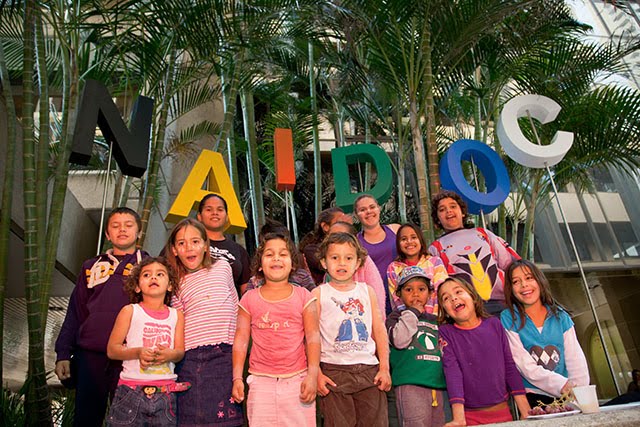MEDIA RELEASE
29 April, 2011
Embargo: 11.30 am (Canberra time)
50/2011
Speaking an Indigenous language linked to youth wellbeing
Aboriginal and Torres Strait Islander youth in remote areas who speak an Indigenous language are less likely to experience risk factors associated with poor wellbeing, according to a report released today by the Australian Bureau of Statistics (ABS).
The report found that in 2008, almost half (47%) of all Aboriginal and Torres Strait Islander youth (aged 15–24 years) in remote areas spoke an Indigenous language. These young people were less likely to engage in high risk alcohol consumption and illicit substance use, than those who did not speak an Indigenous language. They were also less likely to report being a victim of physical violence.
However, the report also showed that there has been a decline in the proportion of Aboriginal and Torres Strait Islander youth who can speak an Indigenous language. In 2008, 13% of all Aboriginal and Torres Strait Islander youth could speak an Indigenous language, down from 18% in 2002.
Despite this decrease in Indigenous language skills, 21% of Aboriginal and Torres Strait Islander children aged 3–14 years who did not speak an Indigenous language at home were learning one. About one in three (31%) children aged 3–14 years also spent time with an Aboriginal or Torres Strait Islander elder at least once a week.
In addition, the report found that youth who had been discriminated against because of their Aboriginal and/or Torres Strait Islander origins were less likely to have some characteristics associated with positive wellbeing.
In 2008, one-quarter (26%) of Aboriginal and Torres Strait Islander youth reported having experienced discrimination in the past 12 months because of their origins. These youth were less likely to be employed, studying full-time or able to get support outside of their households than those who had not experienced discrimination. They were also more likely to have experienced high or very high levels of psychological distress compared with their peers who did not experience discrimination.
More details on these and other topics are available in the April release of the report Aboriginal and Torres Strait Islander Wellbeing: A focus on children and youth (cat.no. 4725.0). Additional analyses of the children and youth data will be available later in 2011.
Media notes:
Psychological distress is measured using a modified version of the Kessler Psychological Distress Scale. High scores indicate that feelings of anxiety or depression may be being experienced on a regular basis, whereas a low score indicates these feelings are experienced less frequently or not at all.
When reporting on ABS data the Australian Bureau of Statistics (or ABS) must be attributed as the source.
This page last updated 28 April 2011
http://www.abs.gov.au/ausstats/abs@.nsf/Latestproducts/4725.0Media%20Release1Apr%202011?opendocument&tabname=Summary&prodno=4725.0&issue=Apr%202011&num=&view=
4725.0 - Aboriginal and Torres Strait Islander Wellbeing: A focus on children and youth, Apr
2011
Source: Australian Bureau of Statistics

Yulu Burri Ba - Dancers of the sand and the sea. This initiative is to address current shortfalls in Indigenous Cultural opportunities as well as assisting attempts to preserve both land and culture. The beginning of an expanding base for opportunity in the Cultural/performing Arts industry, we hope the dance group becomes a stepping stone or building block for young people to shape their own destiny.
Friday, June 3, 2011
Wednesday, May 4, 2011
Taking bookings for NAIDOC
With A Day round the corner, we're gettin the word out now. We are available for bookings for celebrations and functions, whether it be a smoking ceremony, performance, welcolm,opening, workshops or tailored packages/tours and maybe even camps soon. Please contact 0437454628 or email pattycools@live.com.au to find out more or book the dancers for your next event.
Practicin up 4 NAIDOC soon
This is a callout to all dancers, practice begins soon. We'll be steppin it up this year with different ideas 4 performance peieces and projects. Stay tuned or watch this site to find out more in the coming weeks. Contact patty via fb or mobile in the meantime about practice onweekend at the adult learning centre dunwich.
We hope to see a big mob again this year, bring mum, dad, brothers, sisters, nans, pops, aunties and uncles.
We hope to see a big mob again this year, bring mum, dad, brothers, sisters, nans, pops, aunties and uncles.
Subscribe to:
Posts (Atom)